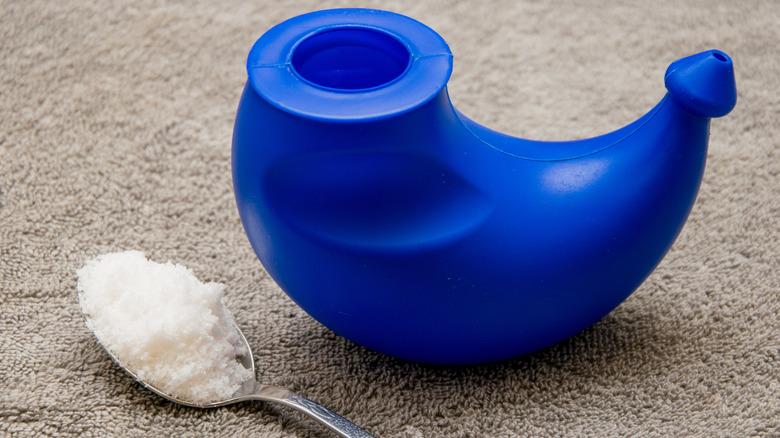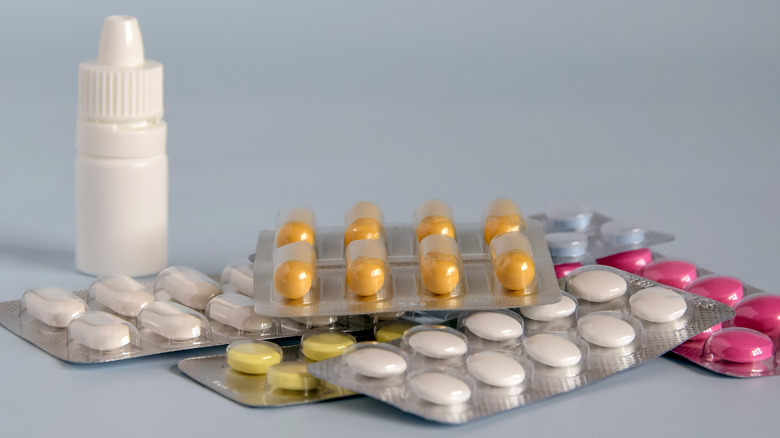The First Thing You Should Do When You Get A Stuffy Nose
Are you feeling stuffed up? It's annoying when you can't smell, taste, or breathe well, and you wonder why you took these abilities for granted when you had them. The Cleveland Clinic points out that nasal congestion will usually go away on its own and isn't typically a sign of anything serious. That being said, you should see your doctor if it doesn't resolve in 10 days. You should also contact a medical professional if you have a stuffy nose and a fever, yellow or green mucus, or mucus with consistent blood.
Your healthcare professional will examine your nose, throat, and ears to see what the cause could be. They might refer you to an otolaryngologist or ENT specialist for further examination, and they may also swab your throat for a culture to see if you have an infection. Causes of your congestion could be anything from allergies to infection to pregnancy or even weather changes (via the Cleveland Clinic). In the meantime, there are ways you can find some relief if you're stuck with a stuffed-up nose.
Rinse your nose
When you get a stuffy nose, the first thing you should do is use a nasal rinse, which can help relieve congestion and other signs of rhinitis, like sneezing and itching (per the American Academy of Allergy Asthma & Immunology). You can get a nasal irrigation kit at your local pharmacy — it will come with a small teapot-shaped device, bottle, bulb syringe, or syringe. Check to make sure it comes with the saline packets if you want to use those instead of mixing a solution yourself. Using a nasal rinse will feel strange the first time, but will get easier with practice.
The Cleveland Clinic points out that the saline solution reduces irritation. The neti pot — or whichever device you have — will push the rinse through your nasal passages, washing away mucus and allergens. Add clean, room temperature water and the saline packet to your neti pot. Stand in front of your bathroom sink, and lean forward as you gently place the tip of the spout at the base of your right nostril. Tip your head downward and lift the device to push the solution through your nose. Allow the solution to drip out of your other nostril and into the sink. Blow your nose with a tissue before repeating on your left nostril.
Take a decongestant
Blood flow to your nose increases when you get sick, causing swelling, which makes you feel stuffed up. Decongestants relieve that swelling and pressure so you can breathe better. Antihistamines can help, too, and some decongestants contain antihistamines for this reason. Decongestants can relieve a stuffy nose, and you can get them at your local pharmacy over-the-counter. They're available in different forms — pills, liquid, nasal sprays, and drops. However, the American Academy of Family Physicians advises not to take decongestants for more than 3 days, as you can become dependent on them.
Consult your doctor if you take any other medications before taking a decongestant, especially if you take asthma or high blood pressure medicine. You should also consult your doctor before taking decongestants if you have underlying health problems, like thyroid or prostate problems, glaucoma, diabetes, heart problems, or high blood pressure. In addition, decongestants can interfere with sleep. Avoid taking them before bed if you experience trouble sleeping (via the American Academy of Family Physicians).
Drink more fluids
You've probably been advised to drink plenty of fluids when you're sick, but do you know why? Dehydration can cause uncomfortable symptoms, like headaches, dizziness, and tiredness, per Self. These are symptoms you may already have if you're sick, and that's why you'll feel even worse if you become dehydrated. Some signs of an illness can cause dehydration — fever, vomiting, or diarrhea — so it's even more crucial to make sure you're getting enough fluids. Many people don't have a good appetite when they're ill and don't eat or drink enough, which is why doctors remind patients to drink plenty of fluids.
Brown University Health Services advises you to drink more fluids when you're sick, particularly hot tea, which will help thin the mucus. Doing so may relieve your stuffy nose. However, go slow and steady with your water intake because there is such thing as too much. How much water varies from person to person, but 8 cups of 8 ounces of water is a good rule to start with, and you might need a little more when sick.




